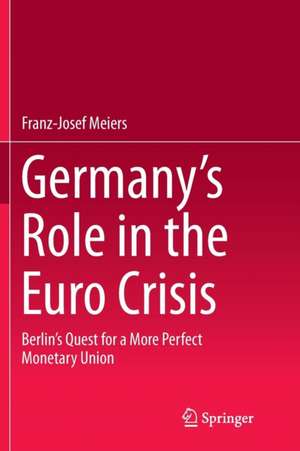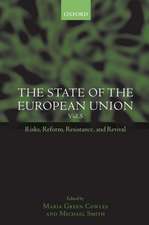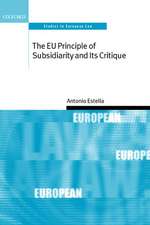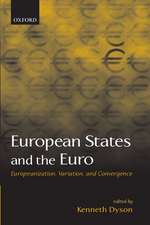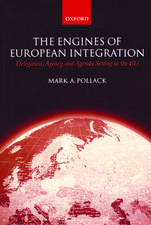Germany’s Role in the Euro Crisis: Berlin’s Quest for a More Perfect Monetary Union
Autor Franz-Josef Meiersen Limba Engleză Paperback – 22 oct 2016
| Toate formatele și edițiile | Preț | Express |
|---|---|---|
| Paperback (1) | 577.07 lei 6-8 săpt. | |
| Springer International Publishing – 22 oct 2016 | 577.07 lei 6-8 săpt. | |
| Hardback (1) | 583.28 lei 6-8 săpt. | |
| Springer International Publishing – 7 sep 2015 | 583.28 lei 6-8 săpt. |
Preț: 577.07 lei
Preț vechi: 678.91 lei
-15% Nou
Puncte Express: 866
Preț estimativ în valută:
110.43€ • 114.64$ • 92.08£
110.43€ • 114.64$ • 92.08£
Carte tipărită la comandă
Livrare economică 22 martie-05 aprilie
Preluare comenzi: 021 569.72.76
Specificații
ISBN-13: 9783319370521
ISBN-10: 3319370529
Ilustrații: VII, 146 p.
Dimensiuni: 155 x 235 mm
Greutate: 0.23 kg
Ediția:Softcover reprint of the original 1st ed. 2015
Editura: Springer International Publishing
Colecția Springer
Locul publicării:Cham, Switzerland
ISBN-10: 3319370529
Ilustrații: VII, 146 p.
Dimensiuni: 155 x 235 mm
Greutate: 0.23 kg
Ediția:Softcover reprint of the original 1st ed. 2015
Editura: Springer International Publishing
Colecția Springer
Locul publicării:Cham, Switzerland
Cuprins
Introduction.- "Made in Germany": Categorial Imperatives of Ordoliberalism.- Teetering at the Edge of the Precipice: Merkel's Politics of Small Steps, 2009-2013.- Germany's Ordoliberal Lodestar and the Shifting Euro Crisis, 2014.- Germany's Role in the Euro Crisis Management.- "Merkelism" and the "New Normal".
Notă biografică
Franz-Josef Meiers studied Political Science, History, and Sociology at the University of Muenster (Germany), Juniata College, Huntingdon, PA (USA), and Duke University, Durham, NC (USA). He received his Bachelor of Arts degree from Juniata College in 1983 and his Dr. phil. and habilitation degrees from the University of Muenster in 1987 and 2005. Since 2007, he is a Senior Lecturer at the Institute of Political Science of the University Erlangen-Nuernberg where he teaches undergraduate and graduate courses in International Relations and the American Political System.
Textul de pe ultima copertă
This book analyses Germany’s role in the euro crisis. Based on the perception of Berlin as the emerging capital of the European Union, the author investigates three interrelated issues: Did the German policy approach of imposing austerity programs on countries in the middle of a deep recession contribute to the successful management of the euro crisis? Does Germany extend its sway over its European partners by forcing them to surrender to the German diktat of fiscal Disziplin and economic efficiency? Is the stubborn insistence on rigid fiscal adjustment another ominous sign of the Berlin Republic moving away from the country’s traditional European vocation toward an imperial leadership role? The book’s main argument is that Germany’s role in and responses to the euro crisis can best be explained by different concepts of self, historical memory, and institutional practices.
Caracteristici
Analyses Germany’s role in the management of the euro crisis Explores whether the Berlin Republic is moving toward an imperial leadership role Shows how German economic policy is influenced by the concept of ordoliberalism
